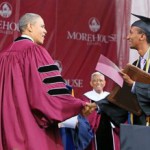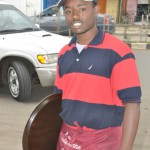 Three centuries ago, Harvard’s Commencement guests could expect to hear quite a bit from graduating students: namely, lengthy thesis defenses given in Greek, Latin, and Hebrew.
Three centuries ago, Harvard’s Commencement guests could expect to hear quite a bit from graduating students: namely, lengthy thesis defenses given in Greek, Latin, and Hebrew.
Today’s versions of those early orations are decidedly shorter and more audience-friendly. But as this year’s student speakers hope to prove, a fair amount of wisdom can be packed into five minutes.
Each spring, the Harvard Commencement Office holds a competition to select an undergraduate speaker, a graduate student speaker, and a Latin speaker. (The latter is a graduating senior and typically a classics concentrator, though rogue classicists with a knack for the dead language are welcome to submit.) At Morning Exercises on May 30, the chosen three will give their addresses before an audience of tens of thousands gathered in Tercentenary Theatre.
Below, the Class of 2013 speakers share their stories and offer a glimpse at the insights and advice they plan to offer their fellow graduates.
Fanaye Yirga, 21, had never studied Latin before coming to Harvard. Born in New York, at age 5 she moved with her parents to their native Ethiopia and attended an international school in the capital, Addis Ababa.
“If you told me freshman year that I’d be giving the Latin oration at Commencement, I’d probably have laughed you out of the room,” said Yirga, who took her first class in the language as a College sophomore.
At Harvard, she had planned to study visual and environmental studies, but her General Education courses in the classics convinced her to switch concentrations.
“My rationale at the time was that I’d rather stay up all night writing papers than stay up all night editing films,” the Cabot House senior said with a laugh.
Last summer, she spent five weeks in a spoken Latin program at the Paideia Institute in Rome, an opportunity that helped prepare her for the speech she will give at Morning Exercises. The address — written, appropriately, in a night-before-deadline burst of inspiration — “uses the all-nighter as a metaphor for the Harvard experience,” she said.
While her immediate future is up in the air, Yirga plans to apply to graduate school to continue studying the languages and texts she discovered at Harvard. She recognizes the irony of majoring in classics, a discipline whose small ranks of undergraduate concentrators often defend it on the grounds that it provides the best training in Western thought.
“As Ethiopians, we have our own classical traditions, so the Western civilization argument doesn’t quite do it for me,” she said. “But I love the literature, and that you get access to this whole tradition.”
Quoting a line from Alan Bennett’s “The History Boys,” one of her favorite plays, she said, “The best moments in reading are when you come across something — a thought, a feeling, a way of looking at things — that you’d thought special, particular to you. And here it is, set down by someone else, a person you’ve never met, maybe even someone long dead. And it’s as if a hand has come out and taken yours.”
By Katie Koch, Harvard Staff Writer





























Join Conversations